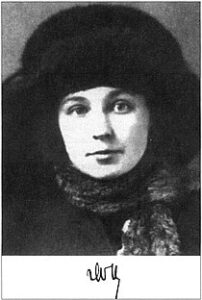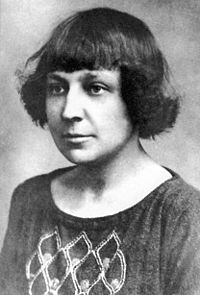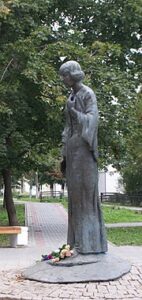Marina Tsvetaeva is a Russian poetess, translator, writer of critical and biographical essays, and, very rightly, one of the major players in 20th-century world poetry. The works of Tsvetaeva are vibrant, expressive, and full of fire, just like their creator. Numerous biographers emphasized the writer’s challenging personality and her erratic temperament, but without these qualities, there wouldn’t be any exquisite writings that are still praised now.
Childhood
Although Tsvetaeva celebrated her birthday on October 9th, 1892—a day that was significant to Marina Ivanovna—she was actually born on October 8th (new style) of that year. A daughter was born in Moscow into the household of renowned philologist and art critic Ivan Vladimirovich Tsvetaev, a professor at Moscow University, and his second wife, professional pianist Maria Main, who was also Nikolai Rubinstein’s pupil.
Along with her own younger sister Anastasia, Marina had half-brothers Andrei and Valeria from her father’s side. Tsvetaeva’s early years were influenced by her parents’ creative careers. Her father instilled a love of fine literature and foreign languages, while her mother taught her how to play the piano and wished to see her daughter have a career in music.
Because Marina and her mother had lived overseas frequently, they were fluent in French, German, and Russian. Moreover, Tsvetaeva wrote poems in all three languages, the majority of them in French, when she was just six years old. The future well-known poetess started her schooling in exclusive gymnasiums for girls in Moscow, from which she was expelled due to her stubborn nature. She then attended boarding schools for girls in Germany and Switzerland. I attempted to enroll in an Old French literature course at the Sorbonne in Paris when I was sixteen years old.
The written word
The poetess actively participated in the literary circles and studios at the Musaget publishing house and established close communication with the Moscow symbolist circle once she started publishing her poetry. “Evening Album,” Marina Tsvetaeva’s debut collection, was released in 1910. It contained compositions primarily from his academic years.
The young poetess’s work soon caught the interest of well-known authors, including Maximilian Voloshin, Valery Bryusov, the father of Russian symbolism, and Nikolai Gumilyov, Anna Akhmatova’s husband. “Magic in Bryusov’s Poems,” Marina’s debut prose piece, was written during this period of triumph. It’s worth noting, by the way, that Tsvetaeva paid for the publication of her first few novels herself. “The Magic Lantern,” her second book of poems, was released shortly after.
The biography of Marina Tsvetaeva was associated with Alexandrov just before the revolution, when she traveled there to see her sister Anastasia and her spouse. This particular time of the poetess’s work is noteworthy since it is filled with odes to loved ones and places, earning it the moniker “Tsvetaeva’s Alexander Summer” from experts. The author wrote the well-known cycles “To Akhmatova” and “Poems about Moscow” around that time.
Marina supported the White movement during the Civil War, even though she didn’t think the country should be divided into conventional colors overall. During that time, Tsvetaeva wrote love plays, extensive poems for the collection “Swan Camp,” as well as pieces for “The Tsar Maiden,” “Egorushka,” and “On a Red Horse.” The poetess’ two major works, “Poem of the End” and “Poem of the Mountain,” were large-scale pieces she created after being compelled to relocate overseas. However, the most of the emigration-era poetry remained unpublished. Marina Tsvetaeva’s writings were included in “After Russia,” the final collection to be published until 1925. Despite this, she never stopped writing.
The works “My Pushkin,” “Mother and Music,” “House at Old Pimen,” and other works by Russian poets Andrei Bely, Maximilian Voloshin, and Mikhail Kuzmin were among the many things that Russian exiles enjoyed more than Tsvetaeva’s writing. However, they refused to purchase poetry, despite the fact that Marina created the amazing cycle “To Mayakovsky,” in which the poetess was startled by the Soviet poet’s suicide, which served as the “black muse.”
Individual existence
In 1911, the Muscovite met Sergei Efron, her future husband, at her friend Maximilian Voloshin’s Koktebel home. Ariadne Efron, their eldest daughter, was born shortly after they were married (their wedding portraits were kept in the archives). However, Marina was a very passionate lady, and other men have won her heart on occasion. For instance, Tsvetaeva had a romantic engagement lasting nearly ten years, despite her exile, with the Russian poet Boris Pasternak.
The poetess and artist Konstantin Rodzevich struck up a passionate relationship in Prague. After roughly six months of dating, Marina—who wrote the “Poem of the Mountain” as a dedicatory poem to her lover—volunteered to assist his fiancee in selecting a wedding gown, effectively ending their romantic relationship.
However, it turned out that Marina Tsvetaeva had relationships with other people besides males. She had a literary circle meeting with poetess and translator Sofia Parnok in 1914, even before she left. The women soon developed a sympathy for one another that gradually developed into more. After Marina dedicated her beloved to a cycle of poetry called “Girlfriend,” their romance emerged from the shadows.
Because to Efron’s intense jealousy and his knowledge of his wife’s extramarital affair, Tsvetaeva was compelled to leave him for Sofia. She did, however, break up with Parnok in 1916, go back to her husband, and give birth to a daughter named Irina a year later. Later on in her peculiar connection, the poetess would declare that although it is exciting for a woman to love another woman, it is monotonous to love males by themselves. Marina, however, called her relationship with Parnok “the first disaster in her life.”
Following the arrival of her second child, Marina Tsvetaeva encountered a difficult period in her life. Revolution, spouse leaving for overseas, abject poverty, starvation. When Ariadna, the oldest daughter, become seriously ill, Tsvetaeva transferred the kids to an orphanage in the Kuntsevo village, which is close to Moscow, posing as orphans. While Ariadne made a full recovery, Irina became ill and passed away at the age of three.
Later, the poetess gave birth to a third child, a son named George who went by Mur in the family, after getting back together with her husband in Prague. Despite being weak and unwell, the youngster fought in the Second World War and died there in the summer of 1944. Georgy Efron was interred in the Vitebsk area in a mass grave. There are now no living descendants of the renowned poetess Tsvetaeva since neither Ariadne nor George produced their own heirs.
Death
Marina and her family were nearly impoverished throughout their exile. Due to illness, Tsvetaeva’s husband was unable to work; Georgy was extremely small; Ariadna attempted to assist financially by stitching hats; but, their only source of revenue was the pitiful amounts that Marina Ivanovna was paid to write articles and essays. The interpreter compared this financial predicament to a protracted, starving death. As a result, family members frequently requested to return to their native country at the Soviet embassy.
Ariadne was granted this privilege in 1937; six months later, Sergei Efron traveled covertly to Moscow after facing arrest threats in France for his alleged involvement in a political killing. Marina eventually crossed the border with her son in official capacity. However, the reunion ended tragically. The girl was detained by the NKVD very quickly, and Tsvetaeva’s husband followed suit. If Ariadne was rehabilitated following Joseph Stalin’s death after serving for more than 15 years, then Efron was shot in October 1941.

But his wife was never informed of this. A mother and her teenage son were evacuated to the town of Elabuga on the Kama River at the start of the Great Patriotic War. The poetess was compelled to take a work as a dishwasher in order to receive temporary registration. Tsvetaeva committed suicide by hanging herself in the residence where she and Georgy were assigned to stay on August 26, 1941, according to her statement dated August 26. It was asphyxia that killed the poetess. Three suicide notes were left by Marina. The author sought for forgiveness from her son in the first letter, and she urged people to look after the youngster in the other two.
It’s interesting to note that when Tsvetaeva was just preparing to go, her longtime friend Boris Pasternak assisted her with packing and even purchased a rope to tie everything up. “At least hang yourself,” the man said, showing off how strong the rope he had found was. As per Mark Slonim, Marina Ivanovna used this rope as the means of committing suicide. Although Tsvetaeva was buried in Yelabuga, it is still unknown where she was interred because of the ongoing conflict.
Funerals for suicide victims are not customarily permitted in Orthodox circles, but the governing bishop may grant an exception. And on the 50th anniversary of the poetess’s passing in 1991, Patriarch Alexy II made use of this privilege. The church service took place at the Nikitsky Gate location of the Moscow Church of the Ascension of the Lord.
Memory
The great Russian poetess was honored with the opening of museums in the cities of Korolev, Feodosia, and the Ivanovo region. Along with the museum, Tsvetaeva’s cherished Tarusa had a memorial designed by Boris Messerer and a cenotaph bearing Marina Ivanovna’s wish to be buried here. There are sculptures in various Russian cities, both nearby and far away.
The documentary “Tsvetaeva. Open,” which explores the life of the Russian poetess, specifically focusing on the momentous time when Marina abandoned her daughters to an orphanage, was presented by Alla Damsker in 2020. Lyudmila Ulitskaya, Konstantin Khabensky, and Elizaveta Boyarskaya were among the actors in the movie.
